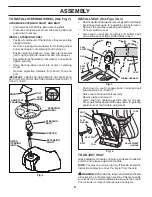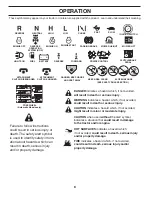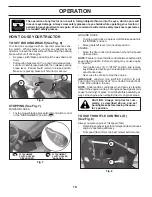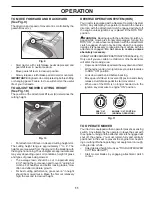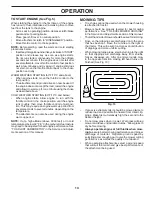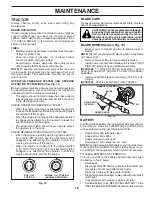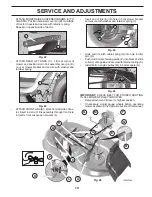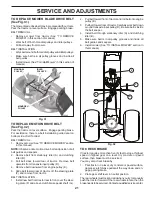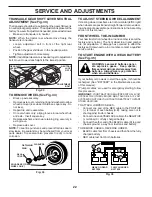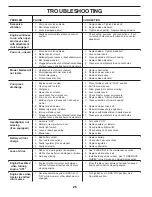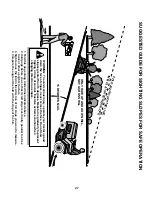
16
AIR FILTER
Your engine will not run properly using a dirty air filter.
Service air cleaner more often under dusty conditions.
See engine manual.
CLEAN AIR SCREEN
Air screen must be kept free of dirt and chaff to prevent
engine dam age from overheating. Clean with a wire brush or
com pressed air to re move dirt and stubborn dried gum fibers.
TRANSAXLE MAINTENANCE
Keep transaxle free from build-up of dirt and chaff which
can restrict cooling.
Do not attempt to clean transaxle while engine is running or
while the transaxle is hot. To prevent pos si ble damage to seals,
do not use high pressure water or steam to clean transaxle.
V-BELTS
Check V-belts for deterioration and wear after 100 hours
of operation and replace if necessary. The belts are not
ad just able. Re place belts if they begin to slip from wear.
ENGINE OIL FILTER
Replace the engine oil filter every season or every other oil
change if the tractor is used more than 100 hours in one
year. See engine man u al.
ENGINE COOLING SYSTEM
To ensure proper cooling, make sure the grass screen,
cooling fins, and other external surfaces of the engine are
kept clean at all times.
Every 100 hours of operation (more often under extremely
dusty, dirty conditions), remove the blower housing and other
cooling shrouds. Clean the cooling fins and external surfaces
as necessary. Ensure the cooling shrouds are reinstalled.
NOTE:
Operating the engine with a blocked grass screen,
dirty or plugged cooling fins, and/or cooling shrouds re moved
will cause engine damage due to overheating.
MUFFLER
Inspect and replace corroded muffler and spark arrester (if
equipped) as it could create a fire hazard and/or damage.
SPARK PLUGS
Replace spark plugs at the beginning of each mowing sea-
son or after every 100 hours of use, whichever comes first.
Spark plug type and gap setting is shown in "PROD UCT
SPECIFICATIONS" section of this manual.
MAINTENANCE
ENGINE
LUBRICATION
Only use high quality detergent oil rated with API service
classification SG-SL. Select the oil’s SAE viscosity grade
according to your expected operating temperature.
Change the oil after every 50 hours of operation or at least
once a year if the tractor is not used for 50 hours in one year.
Check the crankcase oil level before starting the engine
and after each eight (8) hours of operation.
TEMPERATURE RANGE ANTICIPATED BEFORE NEXT OIL CHANGE
SAE VISCOSITY GRADES
-20 0 30 40
80
100
-30
-20 0 20 30
40
F
C
32
-10
10
60
5W-30
10W30
oil_visc_chart4_e
Fig. 16
TO CHANGE ENGINE OIL (See Fig. 16 & 17)
Determine temperature range expected before oil change.
All oil must meet API service classification SG-SL.
• Be sure tractor is on level surface.
• Oil will drain more freely when warm.
• Catch oil in a suitable container.
•
Remove oil fill cap/dipstick. Be careful not to allow dirt
to enter the engine when changing oil.
•
Slide oil drain extension under oil drain hole (drain hole
may be flush with or protrude from engine block side wall).
•
Make sure back face of oil drain extension is flush with
engine side wall.
• Make sure bottom lip of oil drain extension is lined up
with bottom of oil drain hole.
•
Position a container to catch oil directly under front end
of oil drain extension.
Fig. 17
OIL DRAIN HOLE
OIL DRAIN
EXTENSION
OIL DRAIN PLUG
CAUTION: If engine has been operated
for an extended period of time immedi-
ately prior to draining oil, oil will be hot.
•
Slide a 1/2” (12 point) socket mounted on an extension
onto oil drain plug.
•
Loosen plug while holding the oil drain extension firmly
in place.
• Drain oil into container.
•
After oil has drained completely, reinstall oil drain plug.
(Do not tighten more than 13 Ft. Lbs.)
• Refill engine with oil through oil fill dipstick tube. Pour
slowly. Do not overfill. For approximate capacity see
“PRODUCT SPECIFICATIONS” section of this man u al.
• Use gauge on oil fill cap/dipstick for checking level.
Be sure dipstick cap is tightened securely for accurate
reading. Keep oil at “FULL” line on dipstick. Tighten
cap onto the tube securely when finished.





